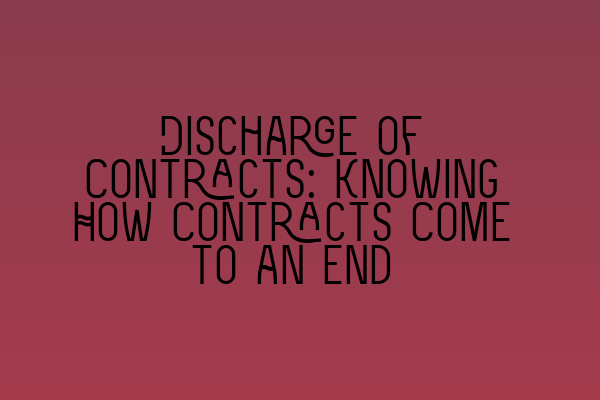Discharge of Contracts: Knowing How Contracts Come to an End
Contracts can be complex legal documents that govern the rights and obligations of parties involved. However, every contract has an end, a point where the parties are no longer bound by its terms. This is known as the discharge of a contract. In this article, we will explore the different ways in which contracts can come to an end and provide you with valuable insights into the discharge process.
1. Performance
The most straightforward way of discharging a contract is through performance. This occurs when both parties fulfill their obligations as outlined in the contract. For example, if Party A agrees to provide goods to Party B, and Party B pays the agreed price, both parties have performed, and the contract is discharged. Performance can be complete, where all obligations are fulfilled, or partial, where some obligations are satisfied.
2. Agreement
Another method of discharging a contract is through mutual agreement. This happens when the parties involved decide to end the contract by mutual consent. They may renegotiate the terms of the contract or enter into a new agreement altogether. It is essential to document any changes to the contract in writing to avoid future disputes. If the original contract is replaced by a new agreement, the original contract is discharged.
3. Frustration
In certain circumstances, a contract can be discharged due to frustration. Frustration occurs when external events make it impossible for the parties to fulfill their obligations. For example, if a contract is entered into for the rental of a specific venue, and the venue is destroyed by fire before the event, the contract is frustrated as it is now impossible to perform. Frustration can also occur when the purpose of the contract becomes impossible or illegal.
4. Breach
When one party fails to fulfill their obligations under the contract, it is considered a breach. A breach of contract can lead to the discharge of the contract, either by the innocent party accepting the breach and releasing the other party from their obligations or by seeking remedies for the breach. Remedies for breach of contract can include compensation for losses suffered or specific performance, where the court orders the breaching party to fulfill their obligations.
5. Operation of Law
Contracts can also be discharged by operation of law, meaning that the law itself intervenes to end the contract. This can happen in situations such as bankruptcy or death, where legal principles automatically discharge the contract. Another example is the expiration of the contract’s stated duration. Once the contract’s specified period has elapsed, it is discharged by operation of law.
Conclusion
Understanding how contracts come to an end is crucial for businesses and individuals alike. Whether it is through performance, mutual agreement, frustration, breach, or operation of law, the discharge of a contract marks the conclusion of legal obligations between parties. By familiarizing yourself with these methods of discharge, you can navigate contract law with confidence and protect your rights and interests.
For more SQE-related resources and information, visit our related articles:
